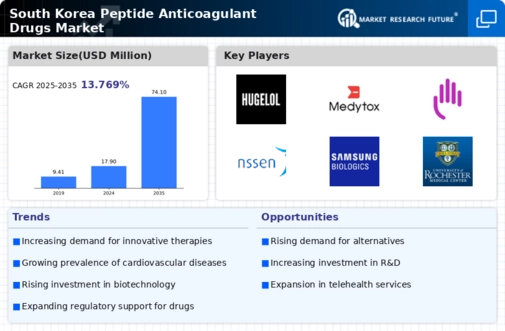The South Korea Peptide Anticoagulant Drugs Market has become increasingly dynamic due to the rising prevalence of cardiovascular diseases and the growing demand for effective anticoagulant therapies. In recent years, technological advancements in drug formulation and the increasing focus on developing innovative and specialized therapies have played a critical role in shaping the competitive landscape of this market. Companies are actively engaging in research and development to improve the efficacy and safety profiles of peptide anticoagulants, which has led to a surge in new product launches and collaborations.
Furthermore, enhanced regulatory frameworks and favorable reimbursement policies have fostered a more conducive environment for market participants, enabling them to expand their offerings and reach. The competitive insights within this sector reflect a combination of strategic partnerships, aggressive marketing initiatives, and a keen focus on addressing unmet medical needs, positioning players to leverage the growth potential within this lucrative market segment.Hugel has positioned itself prominently in the South Korea Peptide Anticoagulant Drugs Market, capitalizing on its commitment to quality and innovation.
The company’s extensive research capabilities have allowed it to develop advanced formulations that cater to specific patient needs within the anticoagulation therapy space.
Hugel's strengths lie in its robust distribution channels and a well-established brand reputation, which facilitates its access to healthcare professionals and patients alike. Their focus on developing highly effective yet safe anticoagulant peptides has garnered positive feedback from the medical community, reinforcing their market presence. Additionally, Hugel's strategic initiatives to expand its product portfolio and invest in clinical trials demonstrate its dedication to maintaining a competitive edge in this growing segment.Korea United Pharmaceutical has been a key player in the South Korea Peptide Anticoagulant Drugs Market, recognized for its comprehensive range of products and commitment to improving patient outcomes.
The company offers a variety of innovative anticoagulant solutions tailored to meet the diverse needs of healthcare providers and patients.
Korea United Pharmaceutical's strengths include a strong R&D foundation, allowing for the continuous enhancement of their product offerings, and an expansive distribution network that ensures widespread market availability. The company has also pursued strategic mergers and acquisitions to augment its market position and diversify its product range, enabling it to compete effectively. With a focus on quality production and regulatory compliance, Korea United Pharmaceutical has established itself as a trusted name in the anticoagulant sector, contributing to the overall growth and accessibility of peptide anticoagulant drugs in South Korea.























Leave a Comment